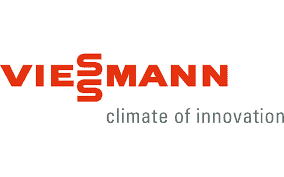The Viessmann Group is a German manufacturer of heating, industrial, and refrigeration systems headquartered in Allendorf (Eder), Germany. With 23 production companies in 12 countries, distribution companies and representative offices in 74 countries and 120 sales offices throughout the world, Viessmann is international in its orientation. 55 percent of turnover is generated abroad. Since January 2018, the company is led by Martin Vießmann (Chairman of the Executive Board), Maximilian Viessmann (Co-CEO) and Joachim Janssen (Co-CEO).
The company was founded in Hof an der Saale in 1917 by Johann Viessmann and has been family owned for four generations. As of 2019, the company employs 12,300 people and reports annual sales of € 2.65 billion.
The Viessmann Group originated in Hof on the banks of the Saale, where Johann Viessmann set up a small workshop in 1917 specialising in the construction of steel boilers. In 1937 he moved operations to Allendorf (Eder) in northern Hesse. After World War II, Hans Vießmann took over his father’s company and modernized it by introducing series production and industrial processes. In the 1950s and 1960s, oil replaced the previously used solid fuels, whilst steel boilers became increasingly important. Viessmann seized these growth opportunities and developed into a medium-sized industrial enterprise with 1,400 employees.
The 1970s were a time of expansion. In 1972, Viessmann opened its first foreign factory in Faulquemont (France), followed by Waterloo, Ontario (Canada), the first site outside Europe, in 1978. With the development of new technologies, the company responded to the challenges of the energy crisis: In 1976, the first solar collectors were produced, followed by the first heat pumps in 1978.
The fall of the Berlin Wall in 1989 opened up new markets – initially in former East Germany and later in Eastern Europe. At the end of 1991/start of 1992, Dr. Hans Vießmann handed the company over to his son Dr. Martin Vießmann.
In the 1990s, major structural changes were taking place: from floor standing boilers to wall-mounted boilers, from oil to gas, from gas-fired boilers to condensing technology. Viessmann set up a new production facility for wall mounted gas boilers in Allendorf, whilst developing an international sales office and branch network. As of 2005, the company launched the “Efficiency Plus” campaign focusing on demonstrating energy-saving and sustainable processes and reducing the company’s environmental footprint, whilst also expanding the product range with the acquisition of other technologies. Viessmann first acquired wood combustion specialists Mawera and Köb, followed by KWT, a manufacturer of large heat pumps and ESS for combined heating and power systems. BIOFerm, Schmack and Carbotech acquisitions covered the area of biogas technology, and with an evacuated tube solar collectors plant in Dachang (China), the company has expanded its market presence into solar thermal systems.
Following the introduction of the company’s “Efficiency Plus” campaign, Viessmann received both in 2009 and 2011 the German Sustainability Award for most sustainable production and most sustainable brand in Germany, respectively. In 2010 the company also received the Energy Efficiency Award for optimising energy production and use in its manufacturing facilities. In 2013, the company received the German Sustainability Award for the third time.
Since January 2018, Martin Vießmann leads the Group as Chairman of the Executive Board. The operative business is headed by two Group-CEOs: Max Viessmann is responsible for the Climate Solutions division and new digital business, while Joachim Janssen concentrates on the Industrial Systems and Refrigeration Solutions divisions.
The Viessmann Group originated in Hof on the banks of the Saale, where Johann Viessmann set up a small workshop in 1917 specialising in the construction of steel boilers. In 1937 he moved operations to Allendorf (Eder) in northern Hesse. After World War II, Hans Vießmann took over his father’s company and modernized it by introducing series production and industrial processes. In the 1950s and 1960s, oil replaced the previously used solid fuels, whilst steel boilers became increasingly important. Viessmann seized these growth opportunities and developed into a medium-sized industrial enterprise with 1,400 employees.
The 1970s were a time of expansion. In 1972, Viessmann opened its first foreign factory in Faulquemont (France), followed by Waterloo, Ontario (Canada), the first site outside Europe, in 1978. With the development of new technologies, the company responded to the challenges of the energy crisis: In 1976, the first solar collectors were produced, followed by the first heat pumps in 1978.
The fall of the Berlin Wall in 1989 opened up new markets – initially in former East Germany and later in Eastern Europe. At the end of 1991/start of 1992, Dr. Hans Vießmann handed the company over to his son Dr Martin Vießmann.
In the 1990s, major structural changes were taking place: from floor standing boilers to wall-mounted boilers, from oil to gas, from gas-fired boilers to condensing technology. Viessmann set up a new production facility for wall mounted gas boilers in Allendorf, whilst developing an international sales office and branch network. As of 2005, the company launched the “Efficiency Plus” campaign focusing on demonstrating energy-saving and sustainable processes and reducing the company’s environmental footprint, whilst also expanding the product range with the acquisition of other technologies. Viessmann first acquired wood combustion specialists Mawera and Köb, followed by KWT, a manufacturer of large heat pumps and ESS for combined heating and power systems. BIOFerm, Schmack and Carbotech acquisitions covered the area of biogas technology, and with an evacuated tube solar collectors plant in Dachang (China), the company has expanded its market presence into solar thermal systems.
Following the introduction of the company’s “Efficiency Plus” campaign, Viessmann received both in 2009 and 2011 the German Sustainability Award for most sustainable production and most sustainable brand in Germany, respectively. In 2010 the company also received the Energy Efficiency Award for optimising energy production and use in its manufacturing facilities. In 2013, the company received the German Sustainability Award for the third time.
Since January 2018, Martin Vießmann leads the Group as Chairman of the Executive Board. The operative business is headed by two Group-CEOs: Max Viessmann is responsible for the Climate Solutions division and new digital business, while Joachim Janssen concentrates on the Industrial Systems and Refrigeration Solutions divisions.


